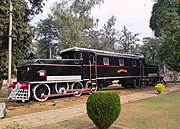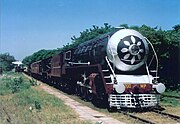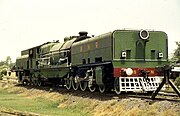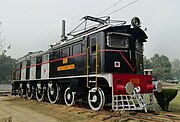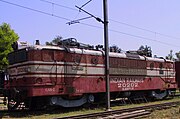National Rail Museum, New Delhi: Difference between revisions
m →External links: add authority control |
Added images and info |
||
| Line 39: | Line 39: | ||
* '''Steam Locomotive A-885 HASANG'''{{citation needed|date=January 2019}} |
* '''Steam Locomotive A-885 HASANG'''{{citation needed|date=January 2019}} |
||
* '''Steam Locomotive X-37385''': This engine was used for trains to [[Ooty]].{{citation needed|date=January 2019}} |
* '''Steam Locomotive X-37385''': This engine was used for trains to [[Ooty]].{{citation needed|date=January 2019}} |
||
*''' |
*'''WDM-2 18040''' : This locomotive was the first [[Indian locomotive class WDM-2|WDM2]] class diesel locomotive which was built by [[American Locomotive Company|ALCO]] in the US. This is a highly successful class and examples of WDM2 and other variants are still found hauling heavy passenger and goods trains to this day. |
||
*'''WAM-1 20202 :''' This is the first WAM-1 and the first AC electric locomotive of the Indian railways. |
|||
* |
*'''Electric Locomotive YCG -E1/21900'''{{citation needed|date=January 2019}} |
||
* '''MG Diesel SR 203 (Fowler Diesel)'''{{citation needed|date=January 2019}} |
* '''MG Diesel SR 203 (Fowler Diesel)'''{{citation needed|date=January 2019}} |
||
* '''Betty Tramways (Fowler Diesel)''': This engine ran in [[Rajkot]] and was owned by Rajkot-Beti Tramways.{{citation needed|date=January 2019}} |
* '''Betty Tramways (Fowler Diesel)''': This engine ran in [[Rajkot]] and was owned by Rajkot-Beti Tramways.{{citation needed|date=January 2019}} |
||
| Line 69: | Line 70: | ||
|File:WAG1 locomotive.jpg|WAG1 20710 Bidhaan |
|File:WAG1 locomotive.jpg|WAG1 20710 Bidhaan |
||
|File:Electric loco 4006.jpg|WCP-1 4006 ‘’Sir Roger Lumley’’ |
|File:Electric loco 4006.jpg|WCP-1 4006 ‘’Sir Roger Lumley’’ |
||
|18=The first WAM-1 20202 “Jagjivan Ram”|File:WAM1 locomotive.jpg}} |
|||
}} |
|||
==See also== |
==See also== |
||
Revision as of 08:17, 10 May 2020
This article needs additional citations for verification. (January 2019) |
 | |
 | |
Former name | Rail Transport Museum |
|---|---|
| Established | 1 February 1977 |
| Location | Chanakyapuri, New Delhi |
| Type | Rail museum |
| Website | nrmindia |



The National Rail Museum in Chanakyapuri, New Delhi, displays exhibits on the history of rail transport in India. The museum was inaugurated on 1 February 1977, and spans over 10 acres (40,000 m2).[1] It is open every day except Mondays and national holidays.[2] In addition to its vast galleries, the museum features simulations of coaches, diesel, electric and steam engines.
History
The National Rail Museum was first proposed in 1962, under the advisement of rail enthusiast Michael Graham Satow. Construction began in 1970 and on 7 October 1971 the foundation stone was laid at the museum's present site in Chanakyapuri, New Delhi, by the then-President of India V. V. Giri.[3] The museum was inaugurated as the Rail Transport Museum in 1977 by Kamalapati Tripathi, the minister for public transportation.
The National Rail Museum was originally intended to be a part of a larger museum that covered the history of railways, roadways, airways, and waterways in India; however, this never happened and it was officially renamed the National Rail Museum in 1995.[4][5]
Main exhibits
- Patiala State Monorail Trainways: This unique steam monorail was built in 1907. The train is based on the Ewing System and connected the town of Bassi with the city of Sirhind-Fatehgarh, approximately 9.7 km (6 mi) apart. This unique train system consists of a single-rail track on which the load-carrying wheel runs, while large iron wheels on either side keep the train upright. The train was built by Orenstein & Koppel of Berlin and ran until October 1927 when the line was closed. The engine and the chief engineer's inspection car remained in the railways' scrapyard where they were discovered by railroad historian Mike Satow in 1962. One of the engines was restored to full working order by the Northern Railway Workshops in Amritsar. The Chief Engineer's private inspection car was also reconstructed on an old underframe. The two are now in working condition and are on display at the museum.[6]
- Fairy Queen: The world's oldest working steam locomotive in operational service.[7]
- Morris Fire Engine: The Morris Fire Engine was built by the fire engineers John Morris and Sons Ltd of Salford, Lancashire, in 1914. The only other Morris-Belsize fire-engine known to exist is preserved by the Whitewebbs Museum of Transport, Clay Hill, London. It was converted to use pneumatic tires, while the fire engine at the National Rail Museum runs on solid rubber tires.[citation needed]
- Saloon of The Prince of Wales: This saloon car was built for the Prince of Wales (later King Edward VII) for his visit to India.[citation needed]
- Saloon of The Maharaja of Indore: This was the saloon car of Holkar Maharaja of Indore.[citation needed]
- Saloon of The Maharaja of Mysore: This was the personal saloon car of the Maharaja of Mysore. The saloon is designed using teak, gold, ivory, and other materials.[citation needed]
- Electric locomotive 4502 Sir Leslie Wilson: This 1928 WCG-1 locomotive belonged to the Great Indian Peninsular Railway (presently Central Railway). It is one of India's first generation 1,500 V DC electric locomotives, which were known as khakis (English: crabs) since they make a curious moaning sound when at rest, and while in motion the linkage emits an unusual swishing sound. Its unusual features included an articulated body, which made it ideal for use in heavily curved sections of the Ghat mountains. The WCG-1 was in operation as a shunting locomotive until 1994 at Mumbai's Chhatrapati Shivaji Terminus.[citation needed]
- Electric locomotive Sir Roger Lumley: This WCP-1 engine has unique wheel arrangements. These locomotives were supplied by the Vulcan Foundry, UK, in 1930. They were electric locomotives operating under 1,500 V DC. They are known for hauling the Mumbai–Pune Deccan Queen Express in its early years. A prototype of this locomotive is on display at the Nehru Science Centre in Mumbai.[citation needed]
- Steam Locomotive A-885 HASANG[citation needed]
- Steam Locomotive X-37385: This engine was used for trains to Ooty.[citation needed]
- WDM-2 18040 : This locomotive was the first WDM2 class diesel locomotive which was built by ALCO in the US. This is a highly successful class and examples of WDM2 and other variants are still found hauling heavy passenger and goods trains to this day.
- WAM-1 20202 : This is the first WAM-1 and the first AC electric locomotive of the Indian railways.
- Electric Locomotive YCG -E1/21900[citation needed]
- MG Diesel SR 203 (Fowler Diesel)[citation needed]
- Betty Tramways (Fowler Diesel): This engine ran in Rajkot and was owned by Rajkot-Beti Tramways.[citation needed]
- Fireless steam locomotive[citation needed]
- Matheran Rail Car No. 8899[citation needed]
- Kalka Shimla Railbus[citation needed]
- Crane tank[citation needed]
Gallery
-
Patiala State Monorail System
-
WCG1 4502 Sir Leslie Wilson
-
HPS2 Class 4-6-0 No. 24467 locomotive
-
WP 7200
-
A Beyer Garratt 6594 Engine at the National Rail Museum
-
An indoor exhibit at National Rail Museum, New Delhi
-
WAG1 20710 Bidhaan
-
WCP-1 4006 ‘’Sir Roger Lumley’’
-
The first WAM-1 20202 “Jagjivan Ram”
See also
References
- ^ "History of the National Rail Museum". nrmindia.com. Retrieved 28 October 2018.
- ^ LTD., C. C. Engineers PVT. "Visiting the National Rail Museum, Where, When". nrmindia.com. Retrieved 28 October 2018.
- ^ "NATIONAL RAIL MUSEUM". nrmindia.com. Retrieved 28 December 2018.
- ^ "Museum History". National Rail Museum. Archived from the original on 23 June 2017. Retrieved 4 July 2017.
- ^ LTD., C. C. Engineers PVT. "NATIONAL RAIL MUSEUM". nrmindia.com. Retrieved 22 September 2018.
- ^ "The Patiala State Monorail Tramway". irfca.org. Retrieved 29 October 2018.
- ^ "8 reasons to take your child to National Rail Museum". The Indian Express. 4 July 2018. Retrieved 26 November 2018.


